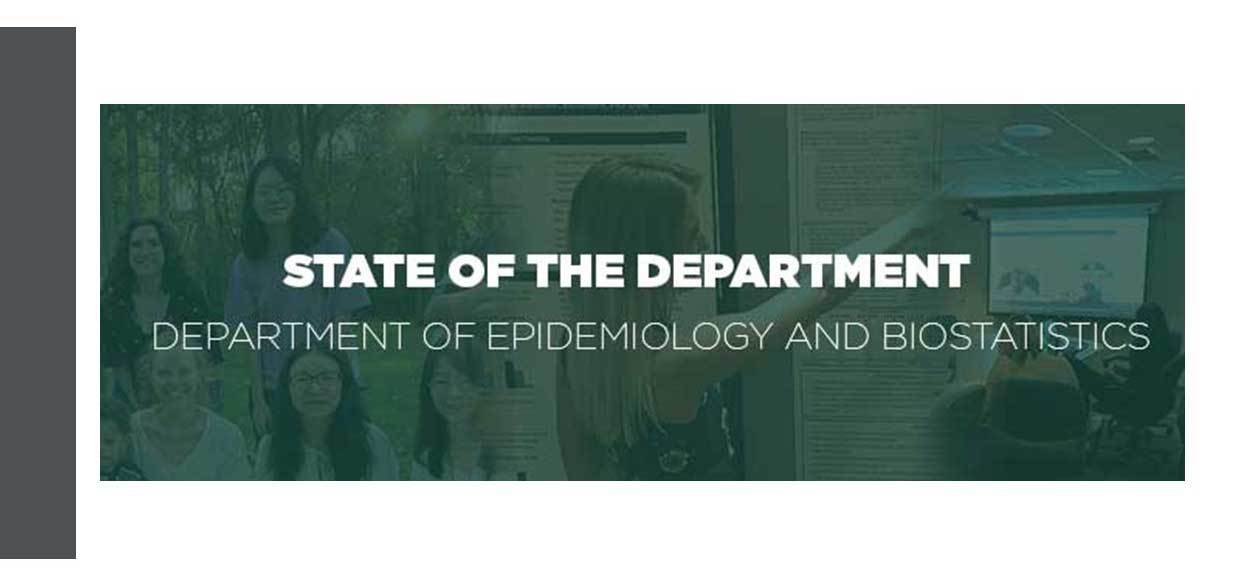2023

Honors/Awards Winners and Nominees
- David Barondess was awarded the CHM Excellence in Teaching Award
- Danielle Gartner was awarded the CHM Teacher-Scholar Award
Hiring/Recruitment/Retirements
- Hongxiang (David) Qiu hired August 2023 (biostatistics)
- Began epidemiology faculty search.
- Claudia Holzman retired May 2023 and became professor emeritus.
Promotions
- Promotion of Dr. David Barondess to Professor.
- Promotion of Dr. Mieka Smart to Associate Professor.
Henry Ford Health Affiliation
- R25 jointly with HFH submitted (second time) by Drs. de los Campos/Levin
- Henry Ford Health System affiliation and appointments continued.
- MSU students completed summer internships at HFH.
RESEARCH
- More than $11.7 million annual external funding by department principal investigators for calendar year 2023 (an increase from the $6.8 million in 2022).
- Department faculty awarded 10 new external grants/contracts as PI and 12 new co-investigator grants/contracts.
- Average external funding for faculty AY ~31.5 percent (increase from 26% in 2022).
EDUCATION
- In 2023, 10 graduate students in our programs completed their degrees!
- 2 MS Biostats
- 4 MS Epidemiology (including 2 dual degree students)
- 2 PhD Biostatistics
- 2 PhD Epidemiology
- Our students and graduates were awarded ~$100,000 in Graduate Office Fellowships and Dissertation Awards from MSU.
- 3nd cohort of EQ-BEST (undergraduate internship) -- with four interns hired.
SERVICE
- Our faculty provided service on several college and university committees.
- RPT committee drafted Annual Reviews of faculty on behalf of the chair. RPT committee wrote a report recommending structure and process for future Annual Reviews.
- Bylaws Working Group began October 2022.
2023 PRIORITIES
DEPARTMENT EPIDEMIOLOGY AND BIOSTATISTICS
We achieved most of the 2022 overall priorities (completing strategic plan, hiring biostatistics faculty, building work with HFH) and are working on the others (1855 position, online AR).
We also addressed the education priorities (implementing a funding model for students; increasing recruitment activities; completing the grad school Strategic Program Assessment; supporting student funding applications.).
We supported one research priority (supporting those applying for centers/program projects) but have not yet achieved the other (convening an in-person research day for faculty and students, including Henry Ford.) In 2024, we are on course to implement the online AR system. We hope to develop the in-person research day.
RECAP OF OUR STRATEGIC PLAN
OVERALL
Department Strategic Planning
We completed our strategic plan and identified goals and areas of growth.
Goals:
- Excellence and innovation in our graduate academic programs.
- Excellence and innovation in our undergraduate academic programs
- Excellence and innovation in research to achieve health equity and promote population health.
- Promote and expand diversity/equity/inclusion in our research and education missions.
- Practice exemplary stewardship of departmental resources (e.g., recycling, energy conservation) in support of MSU’s goal to offer high-quality educational, research and outreach and engagement programs on its diverse campuses in an environmentally-conscious way.
- Create a departmental culture and expectation of mutual respect, awareness, and compassion that people want to be a part of and allows people to be their best self.
We identified key areas of growth based on: 1) Alignment with strengths of our department, CHM (including Henry Ford Health), and MSU; 2) prospective and current student interest; 3) job market for graduates; 4) external funding priorities/ trends; 5) needs for graduate programs.
Areas of growth prioritized by mission are:
EDUCATION
- Leverage partnership with HFH to provide opportunities for internships and theses.
- Expansion of our undergraduate curriculum and programs (majors, minors)
- Creation of epi and biostats curriculum modules for clinicians (trainees, attendings)
SERVICE
- Vision for university in public health and population health.
- Support state health department initiatives and programs and integrating with our programs
- Collaborate with communities on needs assessments, program evaluations, outreach.
RESEARCH
- Build environmental health research.
- Expand neurodegenerative/neurocognitive health research
- Expand mental health/drug use research.
- Expand cancer research.
- Expand causal inference methods research.
- Expand randomized controlled trial research.
- Build infectious disease research.

